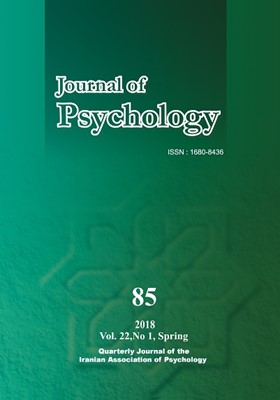مقایسه تجربه اجرای روان حالتی (عملکرد اوج) در ورزشکاران نخبه وغیر نخبه ایرانی
الموضوعات : Psychologyمحمدامین جلیلوند 1 , رسول روشن 2 , مریم اسماعیلی نسب 3 , رسول حمایت طلب 4
1 - دانشکده روانشناسی و علوم تربیتی دانشگاه تهران
2 - دانشکده علوم تربیتی و روانشناسی دانشگاه شاهد
3 - گروه روانشناسی دانشگاه تربیت مدرس
4 - دانشکده روانشناسی و علوم تربیتی دانشگاه تهران
الکلمات المفتاحية: تجربه اجرای روان, عملکرد اوج ورزشکار, نخبه غیرنخبه, روان شناسی ورزش,
ملخص المقالة :
هدف از مطالعة حاضر مقایسه ابعاد اجرای روان(عملکرد اوج) در دانشجویان ورزشکار نخبه و غیر نخبة ایرانی است. به علاوه همبستگی بین عملکرد اوج و اجرای روان، بررسی شد. نظریة اجرای روان به درک چرایی عمل حداکثری (عملکرد اوج) و انگیزة بیرونی کمک می کند. بدین منظور تعداد 105ورزشکار نخبه و غیر نخبه با میانگین سنی 23.5 از میان دانشجویان ورزشکار دانشگاههای شهر تهران انتخاب و به مقیاس اجرای روان حالتی-2، چن و هنگ (2003)، و پرسشنامه جمعیتشناسی پاسخ دادند. نتایج حاصل از آزمون آماري تی مستقل، نشان داد که بین دو گروه ورزشکاران، در ویژگی های؛ تعادل و چالش، اهداف مشخص، بازخورد غیرمبهم و واضح، احساس داشتن کنترل و اجرای روان کلی، تفاوت معنیدار است. بدین ترتیب بین 4بعد از ابعاد نهگانه و خصیصة کلی تفاوت قابلتوجه مشاهده شد. و در دیگر ویژگی ها، اینچنین نبود. بدین ترتیب در ابعاد اجرای روان حالتی برای دو گروه با برتری قابلقبول در میانگین نمرات نخبهها، تفاوت معنادار است. و در کل میانگین ورزشکاران نخبه و غیر نخبه با میانگین نمرة دیگر افراد تفاوت وجود دارد.
بشارت، محمدعلي؛ عباسي، غلامرضا؛ شجاعالدین، صدرالدين(1381). بررسي رابطه بين عزتنفس و موفقيت ورزشي در فوتبالیستها و كشتي گيران. نشریة حركت، 12، 44-31.
واعظ موسوي،سيدمحمدكاظم. مسيبي،فتح اله (1386) روانشناسي ورزشي. تهران: سمت.
فرخی احمد(1392)”تعيين روايي و پایایی نسخةفارسي مقياس کمالگرایی ورزشي درجامعة ورزشكاران ايران: رشد و یادگیری حرکتی– ورزشی، 11، 56.
Asakawa, K. (2004). Flow experience and autotelic personality in Japanese college students: How do they experience challenges in everyday life? Journal of Happiness Studies, 5(2), 123–154.
Asakawa, K. (2010). Flow experience, culture, and well-being: How do autotelic Japanese college students feel, behave, and think in their daily lives? Journal of Happiness Studies, 11(2), 205–223.
Bandura, A. (2006). Guid for constructing self-efficacy scales. In F. Pajares, T. Urdan (Eds.), Selfefficacy beliefs of adolescents (pp. 307-337).
Carter, L., River, B., & Sachs, M. L. (2013). Flow in sport, exercise, and performance: A review with implications for future research. Journal of Multidisciplinary Research, 5(3), 17.
Csikszentmihalyi, M. (1988). Optimal experience: Psychological studies of flow in consciousness. Cambridge University Press.
Csikszentmihalyi M.(2008). Flow: The psychology of optimal experience. New York, NY: Harper Perennial.
Seligman, M. E., & Csikszentmihalyi, M. (2014).Positive psychology: An introduction (pp. 279-298). Springer Netherlands.
Chen, Y.-J., Hung, T.-M., Lin, T.-C., Li, C.-L., Chang, C.-W., & Lin, S.-C.(2003). Confirmatory factor analysis of the Chinese version of Flow State Scale-2. Journal of Sport & Exercise Psychology, 25 (Suppl.).
Dietrich, A. (2004). Neurocognitive mechanisms underlying the experience of flow. Consciousness and Cognition, 13(4), 746–761.
Engeser, S. & Rheinberg, F. (2008). Flow, performance and moderators of challenge-skill balance. Motivation and Emotion, 32, 158-172.
Jackson, S. A., & Csikszentmihalyi, M. (1999).Flow in sports. United States of America: Human Kinetics.
Jackson, S.A., & Eklund, R.C. (2002).Assessing flow in physical activity: The Flow State Scale-2 and Dispositional Flow Scale-2. Journal of Sport and Exercise Psychology, 24, 133-150.
Jackson, A., Eklund, R., & Martin, A. (2008).Assess the optimal psychological state of flow. Revisado en Noviembre 2015.
Kee, Y.H., & Wang, C.K.J. (2008). Relationships between mindfulness, “flow dispositions and mental skills adoption: A cluster analytic approach. Psychology of Sport and Exercise, 9, 393-411.
Mao, Y., Roberts, S., Pagliaro, S., Csikszentmihalyi, M., & Bonaiuto, M. (2016). Optimal experience and optimal identity: A multinational study of the associations between flow and social identity. Frontiers in Psychology, 7.
Mosing, M. A., Magnusson, P. K. E., Pedersen, N. L., Nakamura, J., Madison, G., & Ullén, F. (2012a). Heritability of proneness for psychological flow experiences. Personality and Individual Differences, 53(5), 699–704.
Nakamura, J., & Csikszentmihalyi, M. (2014).The concept of flow. In Flow and the foundations of positive psychology (pp. 239-263).Springer Netherlands.
Nakamura, J., & Csikszentmihalyi, M. (2002).The concept of flow. In C. R. Snyder & S. J. Lopez (Eds.), Handbook of positive psychology (pp. 89–105).
Oliveira, H. Z., Gomes, V. F. P., & Miranda, R. (2015). The Flow State in Young Basketball Players. Psicologia em Estudo, 20(1), 95-106.
Ross, S. R., & Keiser, H. N. (2014). Autotelic personality through a five-factor lens: Individual differences in flow-propensity. Personality and Individual Differences, 59, 3–8.
Swann, C. (2016). Flow in Sport. In Flow Experience (pp. 51-64).Springer International Publishing.
Weinberg, R. S., & Gould, D. (2014). Foundations of Sport and Exercise Psychology, 6E. Human Kinetics.


